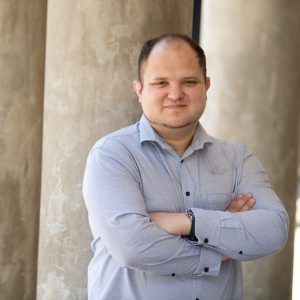By Luke Machowski, Specialist Product Architect
Talented youth are often blocked from entering the working world because they lack experience. This is where the vacation programme mitigates the problem. These programmes are the incubators for innovation, immersion and exploration. Individuals just need to be given an opportunity and an environment that promotes their success.
Synthesis has been running vacation programmes for many years. These programmes take between five and eight individuals twice a year. This year the projects have ranged from creating a new Synthesis recruitment platform to an audiolizer that aids in the reading of braille. It’s amazing to see how the right environment plus the right direction can allow people to unlock their great creative potential. This is why I got involved in the vacation work programme. I must admit that once I saw great creativity happening, I got addicted. I started wondering “How can I make this better?” and “What can I do to guarantee a good outcome for the students?”. And it’s that line of questioning that has kept me involved over the last few years, always wondering “What amazing things will they come up with this time?”.
Vacation work for me is the chance to try all the things we wished we could try but didn’t have the time or headspace to do during the year. Since my focus is on product development, this naturally dove-tails nicely with R&D initiatives for the product roadmap. However, this also works equally well for projects where the client identified an interest in a particular area but the timelines and priorities meant that the team could not deliver on it at the time. The most surprising realisation for me is that Hackathon projects that Synthesis runs also make really great vacation work projects (just spread over six weeks). We have found a way to recycle great ideas from the company, in the form of hackathon project ideas, and extend their longevity by being inspiration for vacation work projects. We don’t forget the cool stuff we thought of as a company.
The value of vacation work is threefold:
- For the student, they get the pang of satisfaction that they achieved something cool that adds value in a way that they probably didn’t imagine possible. The tangible difference to them is that they walk out of the vacation work experience with a lot more confidence to do their practical projects next year.
- For Synthesis, it means that we can tap into hungry minds to move development agenda’s forward that normally would have been put on the backburner. From a recruitment side, it’s a really great way to spot the talent that fits into the culture. I am proud to say that many successful Synthesis people started out in the vacation work programme (and look at them now!).
- For our clients, it means that we have a sustainable pipeline of cool stuff produced by a formula that builds the right people that know how to tap into their collective creative potential. Since most vac work projects are a direct result of client feedback, it ultimately means that the clients get what they wanted but in a way that they probably never imagined it. Win-Win-Win!
There are a few secrets that create a successful vacation work project:
- It only takes one interview to decide whether a vac work student is set up for success or not.
- The student’s skill level is less important than their curiosity, and hunger to learn-by-doing.
- The trick to a successful project is for the leader to identify an area that the student is already good at (sometimes this comes from their existing studies, but more often it comes from their pet-projects and things they do on the side) and then couple it to a problem that makes sense to the company. (The reason this works is because the student is being set up to be autonomous. The leader gives them the “WHY it matters” and connects it to something that they already know. They are then the “client” and can make their own judgement calls around WHAT to do, so it means that their vac work project is just around the company helping them with HOW to do it. The student feels that they had a lot of freedom around WHAT they got to do while getting the chance to have professional developers guide them around HOW they should do it.)
- The dependency diagram appears to be the lightest-weight project management technique that balances the effort required to manage the students while giving them enough direction to self-manage their way to the objective.
In conclusion, I want to thank Synthesis for allowing me to explore my curiosity around the vacation work programme. I am so excited to see how the next wave of leaders is taking the programme forward in ways that I never imagined. I can’t wait to see the amazing things that the students come up with next time.






